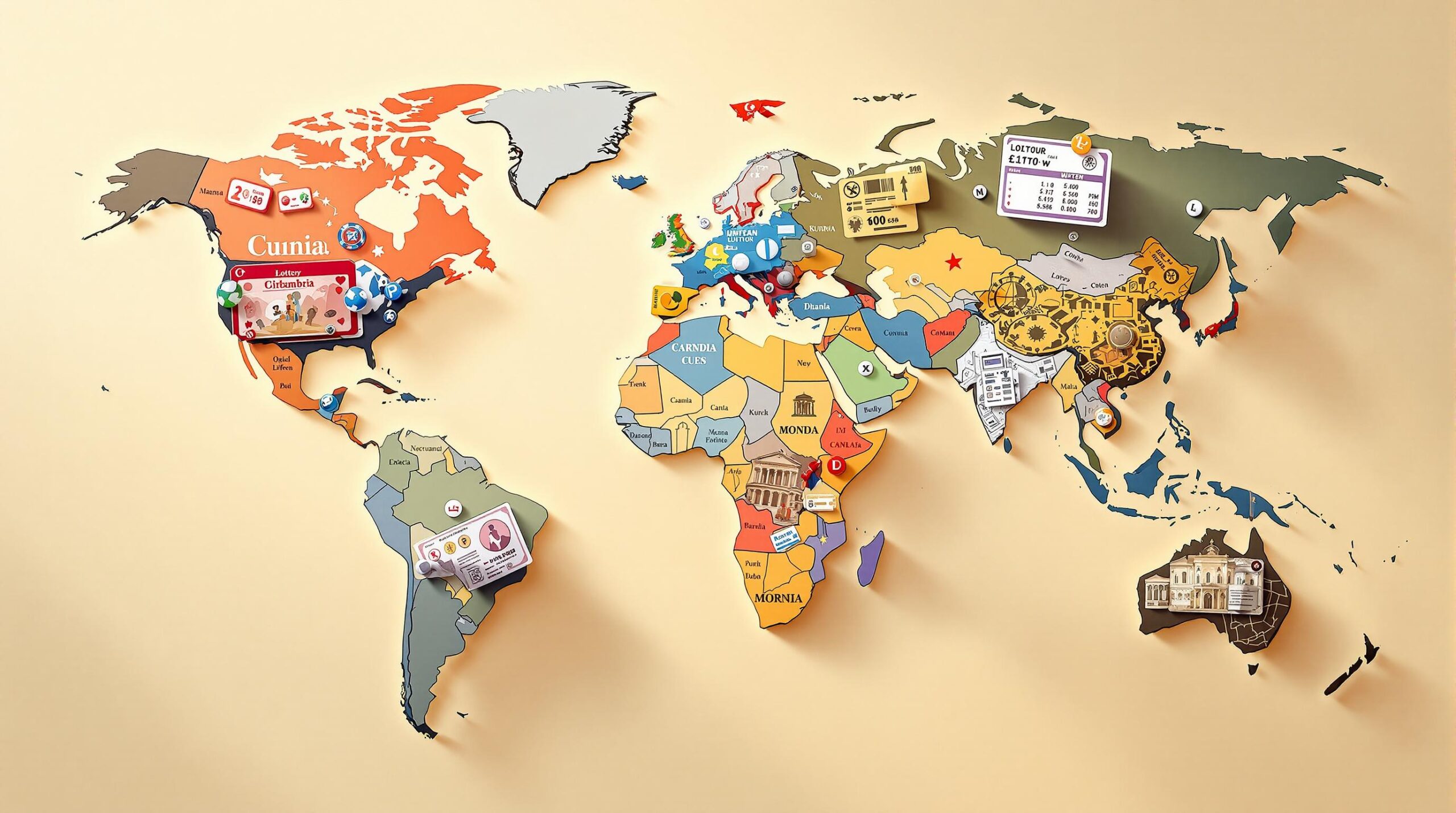Lottery laws differ widely across countries, shaped by local regulations and international agreements. Here’s what you need to know:
- Europe: Countries like the UK and Germany have strict rules, while Spain’s famous Christmas lottery imposes a 10% prize tax.
- North America: The US regulates lotteries at the state level (e.g., Powerball), while Canada offers tax-free winnings under provincial oversight.
- Asia: China runs only state lotteries, and Japan tightly controls its "Takarakuji" system.
- Africa & Middle East: South Africa enforces strict cross-border rules; UAE bans most lotteries except a few government-approved ones.
- Online Lotteries: Increasingly popular, with regulations focusing on fraud prevention, age verification, and secure transactions.
Quick Comparison of Lottery Systems
| Region | Regulation Level | Online Lottery Status |
|---|---|---|
| Europe | National/EU | Permitted with strict rules |
| North America | State/Provincial | Limited by jurisdiction |
| Asia | State-Controlled | Restricted or banned |
| Africa & M.E. | Varied | Mostly prohibited |
Understanding these laws ensures compliance and safe participation, whether you’re playing internationally or operating lotteries across borders.
How to Play Powerball
How Lottery Laws Work Internationally
Lottery regulations across the globe are shaped by a combination of national laws and international agreements, creating a complex system that ensures fair play, consumer protection, and fraud prevention.
Global Agreements Influencing Lottery Regulations
In the European Union, gambling directives play a key role in shaping lottery laws. These directives emphasize protecting consumers, preventing fraud, and ensuring fair gaming practices.
Organizations like the World Lottery Association (WLA) and the European Lotteries (EL) establish industry standards, focusing on responsible gaming and regulatory consistency.
"Europe’s fragmented regulatory framework often causes enforcement challenges", states the European Lotteries Association in their 2024 regulatory guidance report.
The Council of Europe’s Convention on the Manipulation of Sports Competitions works to prevent fraud and maintain lottery integrity across borders. Additionally, guidelines from the International Monetary Fund (IMF) on anti-money laundering (AML/CFT) contribute to creating a safer and more secure lottery environment.
Balancing National and International Regulations
National lottery laws must align with international agreements while addressing specific local needs. This balance results in varied regulations across countries, yet they often adhere to shared global principles.
The interaction between national and international laws is evident in licensing structures:
| Jurisdiction | Licensing Approach | Notable Features |
|---|---|---|
| Malta | Liberal Framework | Strong online lottery regulations; operator-friendly |
| Isle of Man | Transparent System | Emphasis on consumer protection and compliance |
| Liechtenstein | State-Controlled | Early leader in online gaming through ILLF |
Liechtenstein’s pioneering role in online lotteries showcases how local and international efforts can work together effectively.
As the industry becomes more digital, technology is reshaping legal frameworks. Blockchain, for example, is being used to improve transparency and security, aligning with international regulatory goals.
For international players, navigating tax treaties and cross-border rules adds another layer of complexity. As lotteries grow more global, regulatory bodies face the challenge of balancing local authority with international collaboration to uphold fairness and security worldwide.
This dynamic between national and international laws highlights how regulations differ across regions while striving for a unified purpose.
Lottery Laws by Country
Lottery laws around the world reflect the unique cultural, economic, and social priorities of each region. These regulations vary widely, balancing local needs with broader national or international standards.
North America: Lottery Rules and Oversight
In the United States, lotteries are regulated primarily at the state level. Each state has its own lottery commission that enforces specific rules. However, federal oversight plays a role in areas like interstate lottery activities and anti-money laundering (AML) compliance. Popular multi-state games, such as Powerball, are coordinated by the Multi-State Lottery Association (MUSL).
Canada takes a more centralized approach. Under the Canadian Criminal Code, provincial authorities handle lottery operations. For example, the Ontario Lottery and Gaming Corporation (OLG) manages lotteries in Ontario.
In Mexico, operators must register with the government, ensure transparency in prize documentation, and undergo regular audits by the Mexican Gaming Authority.
While North America features a blend of state and federal systems, Europe presents even more diverse regulations shaped by EU principles.
Europe: Lottery Laws and Guidelines
Lottery rules in Europe differ widely by country, though they often align with EU standards. The UK’s Gambling Commission enforces detailed licensing requirements and strong consumer protections, making it one of the most structured systems in the region.
In Germany, recent updates now allow online lotteries under certain conditions. France strictly controls its lottery system, with the Française des Jeux (FDJ) as the sole operator for national games. Spain takes a unique approach by imposing a 10% tax on lottery prizes [5].
Asia and Oceania, on the other hand, combine strict state controls with notable regional differences.
Asia and Oceania: Lottery Systems
China permits only state-run lotteries, like the China Welfare Lottery and the China Sports Lottery. Japan’s "Takarakuji" lottery operates under strict government oversight, with specific rules for online participation.
In Australia, lottery regulation varies by territory. Here’s a breakdown of key regions:
| Region | Primary Regulator | Online Status |
|---|---|---|
| Victoria | Victorian Commission for Gambling Regulation | Permitted with restrictions |
| New South Wales | NSW Lotteries | Limited online offerings |
| Queensland | Office of Liquor and Gaming Regulation | Comprehensive online offerings |
South America: Legal Approaches to Lotteries
In Brazil, federal law grants the Caixa Econômica Federal exclusive rights to run national lotteries, while states manage their own regional games.
Argentina’s system is more decentralized. National-level lotteries are overseen by the Lotería Nacional Sociedad del Estado, but provinces maintain control over local games, leading to a variety of regulatory environments.
Africa and the Middle East: Lottery Restrictions and Regulations
South Africa enforces strict rules for cross-border lottery participation. In the UAE, most lotteries are prohibited, with exceptions like the government-approved Dubai Duty Free Millennium Millionaire.
Israel’s lottery system is entirely state-run. The Mifal HaPayis is the sole authorized operator, maintaining tight control over all gambling activities. This reflects the region’s generally conservative stance on gambling.
sbb-itb-29f0076
Online Lottery Laws and Developments
The shift to digital platforms has introduced new legal challenges for lotteries, with regulations now focusing on safeguarding players, addressing technological changes, and managing cross-border complexities.
Trends in Online Lottery Regulation
Governments worldwide are enhancing online lottery regulations to prioritize player safety and prevent fraud. Many countries have introduced measures like age verification, self-exclusion tools, and mandatory messaging about responsible gaming.
For instance, the UK, Germany, and France have established regulatory systems that are often seen as benchmarks for newer markets. These systems focus on key areas:
| Regulatory Focus | Implementation Examples | Purpose |
|---|---|---|
| Player Protection & Game Integrity | Age verification, spending limits, RNG certification | Prevent underage gambling, combat addiction, and ensure fair play |
| Financial Security | Licensed payment processors, secure transactions | Protect player funds and prevent fraud |
| Data Protection | Compliance with data privacy laws (e.g., GDPR), encryption standards | Safeguard personal and financial information |
These frameworks illustrate how nations are addressing the challenges of online lotteries, leading to diverse regulatory strategies globally.
Countries with Specific Online Lottery Laws
Different countries have taken unique approaches to regulate online lotteries, reflecting their local and international priorities. In the United States, only certain states allow online lottery sales, with Michigan, Pennsylvania, and New York standing out as leaders in adopting digital platforms.
Liechtenstein made history in 1995 by launching PLUS Lotto, the first online lottery, setting a precedent for future global regulations.
"The rise of blockchain technology could lead to more secure and transparent online lotteries, driving regulatory changes", according to a recent industry analysis [4].
Challenges of Cross-Border Online Lotteries
Operating lotteries across borders brings its own set of hurdles, including jurisdictional conflicts, payment processing difficulties, tax-related issues, and compliance challenges. A prime example is EuroMillions, which operates under strict multinational oversight to address these complexities [4].
These obstacles highlight the need for better collaboration between countries to simplify and improve global online lottery operations.
Legal Compliance and Enforcement
Lottery operations must navigate a maze of legal requirements across different regions. Staying compliant with these regulations is crucial to uphold integrity and protect participants.
Common Legal Issues in Lotteries
Fraud and underage participation are two major challenges. For instance, Italy faced scrutiny when a child won a lottery prize, exposing flaws in its age verification systems [3].
Other issues include unauthorized operators disrupting markets and cross-border violations leading to jurisdictional disputes. Addressing these problems often involves measures like digital ID verification, stricter licensing processes, and international collaboration to ensure compliance.
Penalties for Breaking Lottery Laws
Regulators worldwide use fines, license revocations, and other penalties to enforce rules. The UK Gambling Commission is known for its strict approach, imposing heavy fines and revoking licenses when necessary. In the UAE, penalties are even harsher, influenced by religious and cultural considerations.
These penalties are backed by strong enforcement systems, including cross-border monitoring and advanced fraud detection tools.
How Lottery Laws Are Enforced Internationally
International enforcement depends on shared databases and advanced monitoring systems to identify and address violations. Organizations like Malta’s Gaming Authority (MGA) and Italy’s Agenzia delle Dogane e dei Monopoli (ADM) have built detailed regulatory frameworks that serve as global benchmarks [2][3].
Key enforcement strategies include:
- Cross-border monitoring and regular license audits to ensure adherence to international standards.
- The use of cutting-edge tools for fraud detection and verification.
Spain’s €2.4 billion Christmas Lottery is a prime example of effective enforcement at the state level, operating under strict regulatory oversight.
While traditional methods remain important, technology is playing an ever-growing role in enforcement. Tools like blockchain and AI are improving efficiency, but regulators must adapt their frameworks to effectively integrate these advancements. We’ll dive deeper into these technologies in the next section.
What’s Next for Lottery Laws
The lottery industry is undergoing a major shift as technology redefines how games are run and regulated. With these advancements, legal frameworks need to keep up to ensure compliance, protect players, and maintain fairness.
How Technology Is Changing Lotteries
Blockchain platforms like Quanta and Firelotto are revolutionizing lotteries by offering transparent, tamper-proof results and enabling global participation through cryptocurrency. A notable example is the Virginia Lottery, which saw digital sales surpass 55% of total revenue in 2024 – a clear sign of the shift toward online platforms.
Here are some of the key tech trends shaping the industry:
- AI for Fraud Detection: Tools powered by AI are setting new standards for identifying and preventing fraud. For example, the Malta Gaming Authority is leveraging these advancements to enhance digital lottery security [2].
- Advanced Verification Systems: These systems combine multiple technologies to improve player safety and ensure game integrity.
As these innovations take hold, regulators face new challenges and opportunities that require careful navigation.
Possible Changes to Lottery Regulations
Regulations are evolving to address the complexities of digital lotteries. For instance, the European Union’s current policy of letting member states regulate gambling independently may need updating to tackle cross-border digital issues [1]. Globally, regulators are exploring unified frameworks to better manage international operations and protect players.
Some expected regulatory developments include:
| Area | Potential Changes |
|---|---|
| Digital Operations | Stronger AI and blockchain monitoring |
| Cross-Border Gaming | Unified global standards |
| Player Protection | More advanced verification tools |
| Revenue Distribution | Blockchain-based tracking systems |
Research from Allwyn Entertainment projects a 40% increase in lottery sales over the next decade, driven by adapting to younger generations’ preferences. This potential growth is fueling innovation in areas like digital payments and cross-border transaction monitoring.
A forward-looking example comes from the International Lottery in Liechtenstein Foundation (ILLF), which operates under a government-authorized, state-controlled system. This model could inspire future regulatory frameworks in other regions [3].
These changes highlight the need for lottery laws to evolve quickly to match the pace of technological and global advancements.
Conclusion
Europe’s online gambling revenue is projected to grow by 11% annually, reaching $46.94 billion by 2024. This growth underscores the importance of adhering to legal standards in the lottery industry.
Navigating various lottery regulations presents both obstacles and opportunities. As Robert Chvátal, CEO of Allwyn Entertainment, puts it:
"This report informs how the lottery community prepares for tomorrow’s world."
This perspective is especially timely as blockchain and AI technologies begin to reshape regulatory frameworks across the industry.
In emerging markets, lotteries are expanding rapidly. For instance, Latin America’s online gambling market is expected to quadruple by 2027, reaching $6.75 billion. This rapid growth highlights the necessity for stronger international collaboration in regulatory practices.
For safe lottery participation, here are some key considerations:
| Aspect | Action Required |
|---|---|
| Legal and Operator Compliance | Confirm licensing, regulatory adherence, and local laws |
| Cross-Border Rules | Understand limitations for international participation |
| Digital Security | Check platform compliance with regional security standards |
Organizations like the Lagos State Lotteries Board emphasize the importance of robust oversight. As Remi Iwayemi, their Head of Information Technology, explains:
"GLI has played a fantastic role so far. There’s still so much to be done."
As traditional lotteries integrate with digital advancements, updating regulations will be critical to ensure compliance, safeguard players, and maintain fairness. Staying aware of these changes will be crucial for both players and operators as the industry continues to develop.




